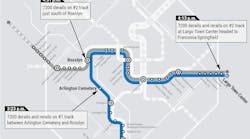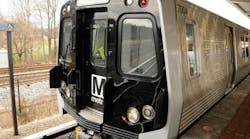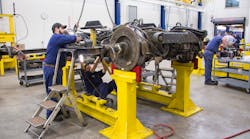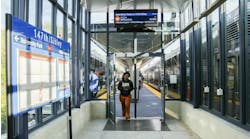WMSC signs off on WMATA’s 7000-series return to service plan
The Washington Metropolitan Area Transit Authority (WMATA) will begin a metered release of no more than 45 percent of its 7000-series railcars back to service after the Washington Metrorail Safety Commission (WMSC) said it had no technical objections to the final plan WMATA submitted.
Following the gradual return of no more than 336 of the railcars, WMATA will institute a 90-day pause until “all aspects of the new inspection cycles are fully established, and any needed adjustments are made under WMSC oversight.”
“From now until after the first of the year, customers may see some 7000-series railcars transition safely back to service,” said WMATA General Manager and CEO Paul J. Wiedefeld. “This is part of the process that will enable Metro to announce a more definitive service plan after the first of the year. Until that time, the transition of the 7000-series railcars through the end of the year will allow us to improve reliability.”
The additional cars will allow WMATA to place an additional 42 trains into service. Metrorail service has been reduced following WMSC’s order the 7000-series fleet – 748 cars representing approximately 60 percent of the Metrorail fleet – be pulled from service after an Oct. 12 derailment when the National Transportation Safety Board (NTSB) found the railcar involved in the incident had a wheelset that was out of compliance with specifications.
The findings of the initial derailment investigation prompted the Federal Transit Administration to issue a safety advisory for State Safety Oversight Agencies to report out-of-tolerance wheel gauges on all rail transit rolling stock in revenue service and conduct inspections of wheel gauges at rail fixed guideway public transportation systems in their jurisdiction. That advisory was followed by a safety alert from the NTSB a month later recommending transit agencies and commuter railroads assess gauge specifications of their fleets and take immediate corrective action should any wheelsets be found to be outside these specifications.
WMATA’s plan for 7000-series return
WMATA says it developed its plan following extensive testing and data analysis, using two 7000-series trains weighted to simulate passenger service, to determine the appropriate inspection intervals to safely return the cars to service. WMSC is requiring data from these trains be gathered over a 90-day period.
The gradual introduction of cars back into service gives WMATA time to prepare the railcars that have been in storage, as well as train maintenance workers on the authority’s new inspection procedures. WMSC will require trains to be inspected every seven days, up from the previous 90-day inspection cycle.
In a series of tweets published on Dec. 14, WMSC explained it would “closely monitor Metrorail’s implementation” of the plan, as well as the data collected and other testing.

Mischa Wanek-Libman | Group Editorial Director
Mischa Wanek-Libman is director of communications with Transdev North America. She has more than 20 years of experience working in the transportation industry covering construction projects, engineering challenges, transit and rail operations and best practices.
Wanek-Libman has held top editorial positions at freight rail and public transportation business-to-business publications including as editor-in-chief and editorial director of Mass Transit from 2018-2024. She has been recognized for editorial excellence through her individual work, as well as for collaborative content.
She is an active member of the American Public Transportation Association's Marketing and Communications Committee and served 14 years as a Board Observer on the National Railroad Construction and Maintenance Association (NRC) Board of Directors.
She is a graduate of Drake University in Des Moines, Iowa, where she earned a Bachelor of Arts degree in Journalism and Mass Communication.





